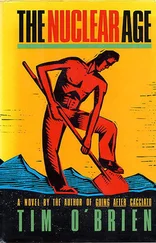“For?”
“I mean, why? ”
John hesitated. “Because—you know—because it’s what I want.”
“Which is what?”
“Just the usual, I guess. Change things. Make things happen.”
Kathy lay on her back, in bed. It was late April of 1967. She was nineteen years old.
“Well, I still don’t get it,” she said. “The way you talk, it sounds calculating or something. Too cold. Planning every tiny detail.”
“And that’s bad?”
“No. Not exactly.”
“What then?”
She made a shifting motion with her shoulders. “I don’t know, it just seems strange, sort of. How you’ve figured everything out, all the angles, except what it’s for .”
“For us,” he said. “I love you, Kath.”
“But it feels—I shouldn’t say this—it feels manipulating.”
John turned and looked at her. Nineteen years old, yes, but still there was something flat and skeptical in her eyes, something terrifying. She returned his gaze without backing off. She was hard to fool. Again, briefly, he was assailed by the sudden fear of losing her, of bungling things, and for a long while he tried to explain how wrong she was. Nothing sinister, he said. He talked about leading a good life, doing good things for the world. Yet even as he spoke, John realized he was not telling the full truth. Politics was manipulation. Like a magic show: invisible wires and secret trapdoors. He imagined placing a city in the palm of his hand, making his hand into a fist, making the city into a happier place. Manipulation, that was the fun of it.
He graduated in June of 1967. There was a war in progress, which was beyond manipulation, and nine months later he found himself at the bottom of an irrigation ditch. The slime was waist-deep. He couldn’t move. The trick then was to stay sane.
His letters from Kathy were cheerful and newsy, full of spicy details, and he found comfort in her chitchat about family and friends. She told funny stories about her sister Pat, about her teachers and roommates and basketball team. She rarely mentioned the war. Though concerned for his safety, Kathy also had doubts about his motives, his reasons for being there.
“I just hope it’s not part of your political game plan,” she wrote. “All those dead people, John, they don’t vote.”
The letter hurt him. He couldn’t understand how she could think such things. It was true that he sometimes imagined returning home a hero, looking spiffy in a crisp new uniform, smiling at the crowds and carrying himself with appropriate modesty and decorum. And it was also true that uniforms got people elected. Even so, he felt abused.
“I love you,” he wrote back, “and I hope someday you’ll believe in me.”
John Wade was not much of a soldier, barely competent, but he managed to hang on without embarrassing himself. He kept his head down under fire, avoided trouble, trusted in luck to keep him alive. By and large he was well liked among the men in Charlie Company. In the evenings, after the foxholes were dug, he’d sometimes perform card tricks for his new buddies, simple stuff mostly, and he liked the grins and bunched eyebrows as he transformed the ace of spades into the queen of hearts, the queen of hearts into a snapshot of Ho Chi Minh. Or he’d swallow his jackknife. He’d open up the blade and put his head back and make the moves and then retrieve the knife from somebody’s pocket. The guys were impressed. Sorcerer, they called him: “Sorcerer’s our man.” And for John Wade, who had always considered himself a loner, the nickname was like a special badge, an emblem of belonging and brotherhood, something to take pride in. A nifty sound, too—Sorcerer—it had magic, it suggested certain powers, certain rare skills and aptitudes.
The men in Charlie Company seemed to agree.
One afternoon in Pinkville, when a kid named Weber got shot through the kidney, Sorcerer knelt down and pressed a towel against the hole and said the usual things: “Hang tight, easy now.” Weber nodded. For a while he was quiet, flickering in and out, then suddenly he giggled and tried to sit up.
“Hey, no sweat,” he said, “I’m aces, I’m golden.” The kid kept rocking, he wouldn’t lie still. “Golden, golden. Don’t mean zip, man, I’m golden .”
Weber’s eyes shut. He almost smiled. “Go on,” he said. “Do your magic.”
In Vietnam, where superstition governed, there was the fundamental need to believe—believing just to believe—and over time the men came to trust in Sorcerer’s powers. Jokes, at first. Little bits of lingo. “Listen up,” somebody would say, “tonight we’re invisible,” and somebody else would say, “That’s affirmative, Sorcerer’s got this magic dust, gonna sprinkle us good, gonna make us into spooks.” It was a game they played—tongue-in-cheek, but also hopeful. At night, before heading out on ambush, the men would go through the ritual of lining up to touch Sorcerer’s helmet, filing by as if at Communion, the faces dark and young and solemn. They’d ask his advice on matters of fortune; they’d tell each other stories about his incredible good luck, how he never got a scratch, not once, not even that time back in January when the mortar round dropped right next to his foxhole. Amazing, they’d say. Man’s plugged into the spirit world.
John Wade encouraged the mystique. It was useful, he discovered, to cultivate a reserved demeanor, to stay silent for long stretches of time. When pressed, he’d put on a quick display of his powers, doing a trick or two, using the everyday objects all around him.
Much could be done, for example, with his jackknife and a corpse. Other times he’d do some fortune-telling, offering prophecies of things to come. “Wicked vibes,” he’d say, “wicked day ahead,” and then he’d gaze out across the paddies. He couldn’t go wrong. Wickedness was everywhere.
“I’m the company witch doctor,” he wrote Kathy. “These guys listen to me. They actually believe in this shit.”
Kathy did not write back for several weeks. And then she sent only a postcard: “A piece of advice. Be careful with the tricks. One of these days you’ll make me disappear.”
It was signed, Kath. There were no endearments, no funny stories.
Instantly, John felt the old terrors rise up again, all the ugly possibilities. He couldn’t shut them off. Even in bright daylight the pictures kept blowing through his head. Dark bedrooms, for instance. Kathy’s diaphragm. What he wanted was to spy on her again—it was like a craving—but all he could do was wait. At night his blood bubbled. He couldn’t stop wondering. In the third week of February, when a letter finally arrived, he detected a new coolness in her tone, a new distance and formality. She talked about a movie she’d seen, an art gallery she’d visited, a terrific Spanish beer she’d discovered. His imagination filled in the details.
February was a wretched month. Kathy was one problem, the war another. Two men were lost to land mines. A third was shot through the neck. Weber died of an exploding kidney. Morale was low. As they plodded from ville to ville, the men talked in quiet voices about how the magic had worn off, how Sorcerer had lost contact with the spirit world. They seemed to blame him. Nothing direct, just a general standoffishness. There were no more requests for tricks. No banter, no jokes. As the days piled up, John Wade felt increasingly cut off from the men, cut off from Kathy and his own future. A stranded sensation—totally lost. At times he wondered about his mental health. The internal terrain had gone blurry; he couldn’t get his bearings.
“Something’s wrong,” he wrote Kathy. “Don’t do this to me. I’m not blind—Sorcerer can see .”
Читать дальше












